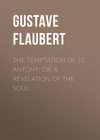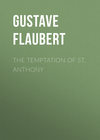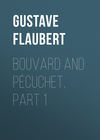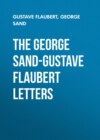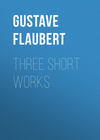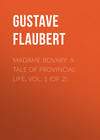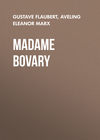Czytaj książkę: «The Temptation of St. Antony; Or, A Revelation of the Soul», strona 6
The pair, side by side, rise softly into the air.
Antony, embracing the cross, watches them ascending.
They disappear.
CHAPTER V.
All Gods, All Religions
ANTONY, walking slowly – "That was really Hell!
"Nebuchadnezzar did not dazzle me so much. The Queen of Sheba did not bewitch me so thoroughly. The way in which he spoke about the gods filled me with a longing to know them.
"I recollect having seen hundreds of them at a time, in the Island of Elephantinum, in the reign of Dioclesian. The Emperor had given up to the nomads a large territory, on condition that they should protect the frontiers; and the treaty was concluded in the name of the invisible Powers. For the gods of every people were ignorant about other people. The Barbarians had brought forward theirs. They occupied the hillocks of sand which line the river. One could see them holding their idols between their arms, like great paralytic children, or else, sailing amid cataracts on trunks of palm-trees, they pointed out from a distance the amulets on their necks and the tattooings on their breasts; and that is not more criminal than the religion of the Greeks, the Asiatics, and the Romans.
"When I dwelt in the Temple of Heliopolis, I used often to contemplate all the objects on the walls: vultures carrying sceptres, crocodiles playing on lyres, men's faces joined to serpents' bodies, women with cows' heads prostrated before the ithyphallic deities; and their supernatural forms carried me away into other worlds. I wished to know what those calm eyes were gazing at. In order that matter should have so much power, it should contain a spirit. The souls of the gods are attached to their images. Those who possess external beauty may fascinate us; but the others, who are abject or terrible … how to believe in them? …"
And he sees moving past, close to the ground, leaves, stones, shells, branches of trees, vague representations of animals, then a species of dropsical dwarfs. These are gods. He bursts out laughing.
Behind him, he hears another outburst of laughter; and Hilarion presents himself, dressed like a hermit, much bigger than before – in fact, colossal.
Antony is not surprised at seeing him again.
"What a brute one must be to adore a thing like that!"
Hilarion– "Oh! yes; very much of a brute!"
Then advance before them, one by one, idols of all nations and all ages, in wood, in metal, in granite, in feathers, and in skins sewn together. The oldest of them, anterior to the Deluge, are lost to view beneath the seaweed which hangs from them like hair. Some, too long for their lower portions, crack in their joints and break their loins while walking. Others allow sand to flow out through holes in their bellies.
Antony and Hilarion are prodigiously amused. They hold their sides from sheer laughter.
After this, idols pass with faces like sheep. They stagger on their bandy legs, open wide their eyelids, and bleat out, like dumb animals: "Ba! ba! ba!"
In proportion as they approach the human type, they irritate Antony the more. He strikes them with his fist, kicks them, rushes madly upon them. They begin to present a horrible aspect, with high tufts, eyes like bulls, arms terminated with claws, and the jaws of a shark. And, before these gods, men are slaughtered on altars of stone, while others are pounded in vats, crushed under chariot-wheels, or nailed to trees. There is one of them, all in red-hot iron, with the horns of a bull, who devours children.
Antony– "Horror!"
Hilarion– "But the gods always demand sufferings. Your own, even, has wished – "
Antony, weeping – "Say no more – hold your tongue!"
The enclosure of rocks changes into a valley. A herd of oxen pastures there on the shorn grass. The shepherd who has charge of them perceives a cloud; and in a sharp voice pierces the air with words of urgent entreaty.
Hilarion– "As he wants rain, he tries, by his strains, to coerce the King of Heaven to open the fruitful cloud."
Antony, laughing – "This is too silly a form of presumption!"
Hilarion– "Why, then, do you perform exorcisms?"
The valley becomes a sea of milk, motionless and illimitable.
In the midst of it floats a long cradle, formed by the coils of a serpent, all whose heads, bending forward at the same time, overshadow a god who lies there asleep. He is young, beardless, more beautiful than a girl, and covered with diaphanous veils. The pearls of his tiara shine softly, like moons; a chaplet of stars winds itself many times above his breast, and, with one hand under his head and the other arm extended, he reposes with a dreamy and intoxicated air. A woman squatted before his feet awaits his awakening.
Hilarion– "This is the primordial duality of the Brahmans – the absolute not expressing itself by any form."
Upon the navel of the god a stalk of lotus has grown; and in its calyx appears another god with three faces.
Antony– "Hold! what an invention!"
Hilarion– "Father, Son and Holy Ghost, in the same way make only one person!"
The three heads are turned aside, and three immense gods appear. The first, who is of a rosy hue, bites the end of his toe. The second, who is blue, tosses four arms about. The third, who is green, weaves a necklace of human skulls. Immediately in front of them rise three goddesses, one wrapped in a net, another offering a cup, and the third brandishing a bow.
And these gods, these goddesses multiply, become tenfold. On their shoulders rise arms, and at the ends of their arms are hands holding banners, axes, bucklers, swords, parasols and drums. Fountains spring from their heads, grass hangs from their nostrils.
Riding on birds, cradled on palanquins, throned on seats of gold, standing in niches of ivory, they dream, travel, command, drink wine and inhale flowers. Dancing-girls whirl around; giants pursue monsters; at the entrances to the grottoes, solitaries meditate. Myriads of stars and clouds of streamers mingle in an indistinguishable throng. Peacocks drink from the streams of golden dust. The embroidery of the pavilions blends with the spots of the leopards. Coloured rays cross one another in the blue air, amid the flying of arrows and the swinging of censers. And all this unfolds itself, like a lofty frieze, leaning with its base on the rocks and mounting to the very sky.
Antony, dazzled – "What a number of them there are! What do they wish?"
Hilarion– "The one who is scratching his abdomen with his elephant's trunk is the solar god, the inspirer of wisdom. That other, whose six heads carry towers and fourteen handles of javelins, is the prince of armies, the fire-devourer. The old man riding on a crocodile is going to bathe the souls of the dead on the seashore. They will be tormented by this black woman with rotten teeth, the governess of hell. The chariot drawn by red mares, which a legless coachman is driving, is carrying about in broad daylight the master of the sun. The moon-god accompanies him in a litter drawn by three gazelles. On her knees, on the back of a parrot, the goddess of beauty is presenting her round breast to Love, her son. Here she is farther on; she leaps with joy in the prairies. Look! look! With a radiant mitre on her head, she runs over the cornfields, over the waves, mounts into the air, and exhibits herself everywhere. Between these gods sit the genii of the winds, of the planets, of the months, of the days, and a hundred thousand others! And their aspects are multiplied, their transformations rapid. Here is one who from a fish has become a tortoise, he assumes the head of a wild boar, the stature of a dwarf!"
Antony– "For what purpose?"
Hilarion– "To establish equilibrium, to combat evil. Life is exhausted, its forms are used up; and it is necessary to progress by metamorphoses of them."
Suddenly a naked man appears, seated in the middle of the sand with his legs crossed. A large circle vibrates, suspended behind him. The little curls of his black hair, deepening into an azure tint, twist symmetrically around a protuberance at the top of his head. His arms, of great length, fall straight down his sides. His two hands, with open palms, rest evenly on his thighs. The lower portions of his feet present the figures of two suns; and he remains completely motionless in front of Antony and Hilarion, with all the gods around him placed at intervals upon the rocks, as if on the seats of a circus. His lips open, and in a deep voice he says:
"I am the master of the great charity, the help of creatures, and I expound the law to believers and to the profane alike. To save the world I wished to be born amongst men; the gods wept when I went away. At first, I sought a woman suitable for the purpose – of warlike race, the spouse of a king, exceedingly virtuous and beautiful, with a deep navel, a body firm as a diamond; and at the time of the full moon, without the intervention of any male, I entered her womb. I came out through her right side. Then the stars stopped in their motions."
Hilarion murmurs between his teeth:
"'And when they saw the stars stop, they conceived a great joy!'"
Antony looks more attentively at the Buddha, who resumes:
"From the bottom of the Himalaya, a religious centenarian set forth to see me."
Hilarion– "'A man called Simeon, who was not to die before he had seen the Christ!'"
The Buddha– "They brought me to the schools. I knew more than the doctors."
Hilarion– " … 'In the midst of the doctors; and all those who heard him were ravished by his wisdom.'"
Antony makes a sign to Hilarion to keep silent.
The Buddha– "I went continually to meditate in the gardens. The shadows of the trees used to move; but the shadow of the one that sheltered me did not move. No one could equal me in the knowledge of the Sacred Writings, the enumeration of atoms, the management of elephants, waxworks, astronomy, poetry, boxing, all exercises and all arts. In compliance with custom, I took a wife; and I passed the days in my royal palace, arrayed in pearls, under a shower of perfumes, fanned by the fly-flappers of thirty-three thousand women, and gazing at my people from the tops of my terraces adorned with resounding bells. But the sight of the world's miseries made me turn aside from pleasures. I fled. I went a-begging on high-ways, covered with rags collected in the sepulchres; and, as there was a very learned hermit, I offered myself as his servant. I guarded his door; I washed his feet. All sensation, all joy, all languor, were annihilated. Then, concentrating my thoughts on a larger field of meditation, I came to know the essence of things, the illusion of forms. I speedily abandoned the science of the Brakhmans. They are eaten up with lusts beneath their austere exterior; they anoint themselves with filth, and sleep upon thorns, believing that they arrive at happiness through the path of death!"
Hilarion– "Pharisees, hypocrites, whited sepulchres, race of vipers!"
The Buddha– "I, too, have done astonishing things – eating for a day only a single grain of rice – and at that time grains of rice were not bigger than they are now – my hair fell off; my body became black; my eyes, sunken in their sockets, seemed like stars seen at the bottom of a well. For six years I never moved, remaining exposed to flies, to lions, and to serpents; and I subjected myself to burning suns, heavy showers, snow, lightning, hail, and tempest, without even shielding myself with my hand. The travellers who passed, assuming that I was dead, flung clods of earth at me from a distance.
"There only remained for me to be tempted by the Devil.
"I invoked him.
"His sons came – hideous, covered with scales, nauseous as charcoal, howling, hissing, bellowing, flinging at each other armour and dead men's bones. Some of them spirted out flames through their nostrils; others spread around darkness with their wings; others carried chaplets of fingers that had been cut off; others drank the venom of serpents out of the hollows of their hands. They have the heads of pigs, rhinoceroses, or toads – all kinds of figures calculated to inspire respect or terror."
Antony, aside – "I endured that myself in former times."
The Buddha– "Then he sent me his daughters – beautiful, well-attired with golden girdles, teeth white as the jasmine, and limbs round as an elephant's trunk. Some of them stretched up their arms when they yawned to display the dimples in their elbows; others blinked their eyes; others began to laugh and others unfastened one another's garments. Amongst them were blushing virgins, matrons full of pride, and queens with great trains of baggage and attendants."
Antony, aside– "Ah! that also!"
The Buddha– "Having vanquished the demon. I passed twelve years in nourishing myself exclusively on perfumes, – and, as I had acquired the five virtues, the five faculties, the ten forces, the eighteen substances and penetrated into the four spheres of the invisible world, the Intelligence was mine, and I became the Buddha!"
All the gods bow down, those who have many heads lower them all at the same time. He raises his hand on high in the air, and resumes:
"In view of the deliverance of beings, I have made hundreds of thousands of sacrifices; I have given to the poor robes of silk, beds, chariots, houses, heaps of gold and diamonds. I have given my hands to the one-handed, my legs to the lame, my eyes to the blind; I have cut off my head for the decapitated. At the time when I was king, I distributed the provinces; at the time when I was Brakhman, I despised nobody. When I was a solitary I spoke words of tenderness to the thief who tried to cut my throat. When I was a tiger, I let myself die of hunger. And in this final stage of existence, having preached the law, I have nothing more to do. The great period is accomplished. The men, the animals, the gods, the bamboos, the oceans, the mountains, the grains of sand of the Ganges, with the myriads of myriads of stars, everything, must perish; and, until the new births, a flame will dance on the ruins of a world's overthrow."
Then a vertigo seizes the gods. They stagger, fall into convulsions, and vomit forth their existences. Their crowns break to pieces; their standards fly away. They get rid of their attributes and their sexes, fling over their shoulders the cups from which they drink immortality, strangle themselves with their serpents, and vanish in smoke; and, when they have all disappeared:
Hilarion, slowly – "You have just seen the creed of many hundreds of millions of men!"
Antony is on the earth, his face in his hands. Standing close to him, and turning his back to the cross, Hilarion watches him.
A rather lengthened period elapses.
Then a singular being appears, with the head of a man and the body of a fish. He advances straight through the air, tossing the sand with his tail; and his patriarchal face and his little arms make Antony laugh.
Oannes, in a plaintive voice – "Treat me with respect! I am the contemporary of the beginning of things.
"I have dwelt in the shapeless world, where slumbered hermaphrodite animals, under the weight of an opaque atmosphere, in the depths of gloomy waves – when the fingers, the fins, and the wings were confounded, and eyes without heads floated like molluscs amongst human-faced bulls and dog-footed serpents.
"Over the whole of those beings Omoroca, bent like a hoop, stretched her woman's body. But Belus cut her clean in two halves, made the earth with one, and the heavens with another; and the two worlds alike mutually contemplate each other. I, the first consciousness of chaos, I have arisen from the abyss to harden matter, to regulate forms; and I have taught men fishing, the sowing of seed, the scripture, and the history of the gods. Since then, I live in the ponds that remained after the Deluge. But the desert grows larger around them; the wind flings sand into them; the sun consumes them; and I expire on my bed of lemon while gazing across the water at the stars. Thither am I returning."
He makes a plunge and disappears in the Nile.
Hilarion– "This is an ancient god of the Chaldeans!"
Antony, ironically – "Who, then, were the gods of Babylon?"
Hilarion– "You can see them!"
And they find themselves upon the platform of a quadrangular tower rising above other towers, which, growing narrower in proportion as they rise, form a monstrous pyramid. You may distinguish below a great, black mass – the city, without doubt – stretching along the plain. The air is cold; the sky is of a sombre blue; the multitudinous stars palpitate.
In the middle of the platform stands a column of white stone. Priests in linen robes pass and return all round, so as to describe in their evolutions a moving circle, and, with heads raised, they contemplate the stars.
Hilarion points out several of them to Saint Antony:
"There are thirty chief priests. Fifteen gaze upon the region above the earth, and fifteen on the region below it. At regular intervals one of them rushes from the upper regions to the lower, whilst another abandons the lower to mount towards the empyrean.
"Of the seven planets, two are benevolent, two malevolent, and three ambiguous; everything in the world depends on these eternal fires. According to their position and their movements, one may draw prognostications, and you are now treading on the most sacred spot on earth. There Pythagoras and Zoroaster may be met. Two thousand years have these men been observing the sky, the better to comprehend the gods."
Antony– "The stars are not gods!"
Hilarion– "Yes! say they; for, while things are continually passing around us, the sky, like eternity, remains unchangeable!"
Antony– "Nevertheless, it has a master."
Hilarion, pointing at the column – "That is Belus, the first ray, the sun, the male! – the other, which is fruitful, is under him!"
Antony observes a garden lighted up with lamps. He is in the midst of the crowd in an avenue of cypress-trees. To right and left little paths lead towards huts erected in a wood of pomegranate-trees, which protect lattices of reeds. The men, for the most part, have pointed caps with laced robes, like the plumage of peacocks. There are people from the North clad in bearskins; nomads in brown woollen cloaks; pale Gangarides with long ear-rings; and the classes, like the nationalities, appear to be confused, for sailors and stone-cutters jostle against princes wearing tiaras of carbuncles and carrying large walking-sticks with carved heads. All hurry forward with dilated nostrils, filled with the same desire.
From time to time they got out of the way, in order to allow a long, covered chariot, drawn by oxen, to pass, or perhaps it is an ass jolting on his back a woman closely veiled, who also disappears in the direction of the huts.
Antony is frightened. He desires to turn back. However, an inexpressible curiosity leads him on.
Beneath the cypress-trees women are squatted in rows upon deerskins, each of them having for a diadem a plait of cords. Some of them, magnificently attired, address the passers-by in loud tones. The more timid keep their features hidden between their hands, whilst, from behind, a matron – no doubt, their mother – encourages them. Others, with heads enveloped in black shawls, and the rest of their bodies quite nude, seem, at a distance, like statues of flesh. As soon as a man flings money on their knees, they rise. And one can hear kisses amid the foliage, and sometimes a great, bitter cry.
Hilarion– "Those are the virgins of Babylon who prostitute themselves to the goddess."
Antony– "What goddess?"
Hilarion– "There she is!"
And he shows Antony, at the very end of the avenue, on the threshold of an illuminated grotto, a block of stone representing a woman.
Antony– "Infamy! What an abomination to give a sex to God!"
Hilarion– "You conceive Him, surely, as a living person!"
Once more Antony finds himself in darkness.
He perceives in the air a luminous circle placed on horizontal wings. This species of ring surrounds, like a girdle that is too loose, the figure of a small man with a mitre on his head and a crown in his hand, the lower part of whose body is shut out from view by the huge feathers exhibited in his kilt.
This is Ormuz, the God of the Persians. He flutters while he exclaims:
"I am terrified! I catch a glimpse of his mouth. I have vanquished thee, Ahriman! But thou art beginning again!
"At first, revolting against me, thou didst destroy the eldest of creatures, Kaiomortz, the man-bull. Then, thou didst seduce the first human pair, Meschia and Meschiana, and didst fill their hearts with darkness, and press forward thy battalions towards Heaven.
"I had my own, the inhabitants of the stars, and I gazed down from my throne on all the planets in their different spheres.
"Mithra, my son, dwelt in an inaccessible spot. There he received souls, and sent them forth, and, each morning he arose to pour out his riches.
"The splendour of the firmament was reflected by the earth. The fire shone on the mountains – image of the other fire with which I have created all beings. To secure it from defilement, they did not burn the dead, who were transported to Heaven on the beaks of birds.
"I have regulated pasturages, labours, the wood of sacrifice, the forms of cups, the words that must be uttered in insomnia; and my priests prayed continually in order that their worship should correspond to the eternity of God. They purified themselves with water; they offered up loaves on the altars; they confessed their sins in loud tones.
"Homa gave himself to men to drink in order to communicate his strength to them.
"While the genii of Heaven were fighting the demons, the children of Iran chased the serpents. The King, whom a countless train of courtiers served on bended knees, was attired so as to resemble me in person, and wore my head-dress. His gardens had the magnificence of a celestial earth; and his tomb represented him slaying a monster – emblem of the good which exterminates evil. For, one day, it came to pass – thanks to the endless course of time – that I triumphed over Ahriman. But the interval that separates us is disappearing; the night is rising! Help, Amschaspands, Irzeds, Ferouers! Come to my assistance, Mithra! take thy sword! Caosyac, who must come back to save the world, defend me! How is this? … No one!
"Ah! I am dying! Ahriman, thou art the master!"
Hilarion, behind Antony, restrains an exclamation of joy, and Ormuz plunges into the darkness.
Then appears the great Diana of Ephesus, black, with enamelled eyes, elbows at her sides, forearms turned out, and hands open.
Lions crouch upon her shoulders; fruits, flowers and stars cross one another upon her chest; further down three rows of breasts exhibit themselves, and from the belly to the feet she is caught in a close sheath, from which sprout forth, in the centre of her body, bulls, stags, griffins and bees. She is seen in the white gleaming caused by a disc of silver, round as the full moon, placed behind her head.
"Where is my temple? Where are my amazons? How is it with me – me, the incorruptible – that I find myself so impotent?"
Her flowers wither; her fruits, over-ripe, hang loose; the lions and the bulls bow down their necks; the stags, exhausted, begin to pant; the bees, with a faint buzzing, fall dying upon the ground. She presses her breasts one after the other. They are empty! But, yielding to a desperate pressure, her sheath bursts open. She clutches the end of it, like the skirt of a dress, flings into it her animals and her flower-wreaths, then goes back into the darkness; and in the distance voices murmur, grumble, roar, cry, or bellow. The density of the night is increased by the winds. A warm shower begins to fall in heavy drops.
Antony– "How pleasant is this odour of palm-trees, this rustling of green leaves, this transparency of fountains! I would like to lie down flat upon the ground, in order to feel it close to my heart, and my life would be renewed in eternal youth!"
He hears the sound of castanets and cymbals, and, in the midst of a rustic crowd, men clad in white tunics, with red bands, lead out an ass, richly harnessed, his tail adorned with ribands and his hoofs painted. A box, covered with a saddle-cloth of yellow linen, sways to and fro upon his back, between two baskets, one of which receives the offerings deposited there – eggs, grapes, pears, cheeses, poultry, and small coins – while the second is full of roses, which the drivers of the ass scatter before him as they move along. The latter wear pendants in their ears, large cloaks, plaited tresses, and have their cheeks painted. Each of them has an olive crown fastened around his forehead by a figured medallion. They carry daggers in their girdles, and flourish whips with ebony handles, each having three thongs mounted with ossicles. The last in the procession fix in the ground erect, as a chandelier, a huge pine-tree, whose summit is on fire, and the lowest branches of which overshadow a little sheep.
The ass stops. The saddle-cloth is removed; and underneath appears a second covering of black felt. Then one of the men in a white tunic begins to dance, while playing upon castanets; while another, on his knees before the box, beats a tambourine; and the oldest of the band commences:
"Here is the Bona Dea, the divinity of the mountains, the great mother of Syria! Draw hither, honest people! She procures joy, heals the sick, bestows fortunes, and satisfies lovers. It is we who bring her out to walk in the country in fine weather and bad weather. We often sleep in the open air, and we have not a well-served table every day. The thieves dwell in the woods. The beasts rush forth from their dens. Slippery paths line the precipices. Look here! look here!"
They raise the coverlet and disclose a box incrusted with little pebbles.
"Higher than the cedar-trees she hovers in the blue ether. More circumambient than the winds, she surrounds the world. Her respiration is exhaled through the nostrils of tigers; her voice growls beneath the volcanoes; her anger is the storm; and the pallor of her face has made the moon white. She ripens the harvests; she swells out the rinds; she makes the beard grow. Give her something, for she hates the avaricious!"
The box flies open; and beneath an awning of blue silk is seen a little image of Cybele, glittering with spangles, crowned with towers, and seated on a chariot of red stone, drawn by two lions with raised paws.
The crowd presses forward to see.
The archi-gallus continues:
"She loves the sounds of dulcimers, the stamping of feet, the howling of wolves, the echoing mountains and the deep gorges, the flower of the almond-tree, the pomegranate and the green figs, the whirling dance, the high-sounding flute, the sweet sap, the salt tear, – blood! Help! help! Mother of mountains!"
They flagellate themselves with their whips, and the strokes resound on their breasts. The skins of the tambourines vibrate till they almost burst. They seize their knives and inflict gashes on their arms:
"She is sad: let us be sad! He who is doomed to suffer must weep! In that way your sins will be remitted. Blood washes out everything: shed drops of it around, then, like flowers. She demands that of another – of one who is pure!"
The archi-gallus raises his knife above the sheep,
Antony, seized with horror – "Don't slaughter the lamb!"
A purple flood gushes forth. The priests sprinkle the crowd with it; and all – including Antony and Hilarion – ranged around the burning tree, silently watch the last palpitations of the victim. From the midst of the priests comes a woman, exactly like the image enclosed in the little box. She stops on seeing a young man in a Phrygian cap.
His thighs are covered with tight-fitting breeches opened here and there by lozenges which are fastened with coloured bows. He rests his elbows against one of the branches of the tree, holding a flute in his hand, in a languishing attitude.
Cybele, encircling his figure with her arms —
"To rejoin thee I have travelled through every region – and famine ravaged the fields. Thou hast deceived me! No matter, – I love thee! Warm my body! Let us unite!"
Atys– "The spring-time will return no more, O eternal Mother! Despite my love, it is not possible to penetrate thy essence. I should like to cover myself with a coloured robe like thine. I envy thy breasts, swollen with milk, the length of thy tresses, thy mighty sides from which spring living creatures. Would that I were like thee! Would that I were woman! But no! that can never be! My virility fills me with horror!"
With a sharp stone he mutilates himself; then he begins to run madly around.
The priests imitate the god; the faithful, the priests. Men and women exchange their garments and embrace one another; and this whirlwind of blood-stained flesh hurries away, whilst the voices, ever continuing, become more clamorous and shrill, like those one hears at funerals.
A great catafalque hung with purple carries on its summit a bed of ebony, surrounded by torches and baskets of silver filigree, in which are contained green lettuces, mallows, and fennel. Upon the seats, above and below, are seated women, all attired in black, with girdles undone and naked feet, and holding with a melancholy air huge bouquets of flowers.
On the ground, at the corners of the platform, alabaster urns filled with myrrh are sending up light wreaths of smoke. On the bed may be seen the corpse of a man. Blood trickles from his thigh. His arm is hanging down, and a dog, who is howling, licks his nails. The line of torches placed too close to one another prevents his figure from being completely visible. Antony is seized with anguish. He is afraid of seeing the face of some one he knew.
The women cease their sobbing; and, after an interval of silence, all, at the same time, burst into a psalm:
"Beautiful! beautiful! he is beautiful! Enough of sleep – raise his head! Up! Inhale our bouquets! These are narcissi and anemones gathered in thy gardens to please thee. Return to life! thou fillest us with fear!
